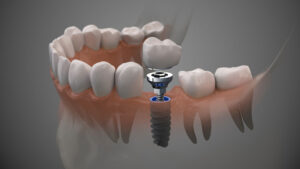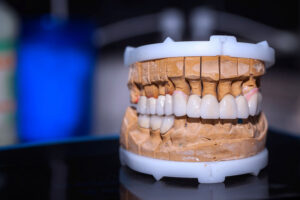How to Avoid Dental Infections
When an area is healing following an oral surgery, we provide clear steps to help ease discomfort and help you to avoid the possibility of a dental infection.
You wake up in the middle of the night with your tooth throbbing with pain. You get up, feel your face and look in the mirror. Just as you suspected when you felt your face you have now confirmed in the mirror. Your face is swollen and throbbing with pain. “How did this happen? What could I have done to avoid it?” These may be some of the thoughts running through your brain as you head to the dentist to determine what is going on.
There are a number of reasons that a person can develop a dental-related infection. The source of dental infection can be simple, such as food caught in your gums or untreated gum disease, more slow-growing causes such as a deep cavity or filling, or secondary to a procedure that was done at the dental office such as a wisdom tooth extraction. Regardless of the cause, once an infection has happened it is important to seek appropriate care to ensure the infection does not spread and become more difficult to treat. In the long run, it is key to understand that excellent oral health helps to protect your overall health.
How to Reduce Risks of Dental Infection With Preventative Dental Care
The good news is that most infections are completely avoidable. The first two categories are related to either acute accidents or long-term dental complacency. The first of these categories generally cannot be avoided, such as you get a popcorn kernel stuck in between two teeth.
The second can easily be avoided through seeking out regular routine dental care and following through on dental treatment recommendations. Most of these infections are caused by untreated tooth decay. Left untreated the decay slowly grows in a tooth until it reaches the nerve of the tooth. Once decay has reached the nerve, bacteria have now infected the nerve system of that root. Left unchecked this will ultimately result in a dead nerve, infection, and pain originating in that tooth.
Untreated decay happens if you become lax in seeing your dentist resulting in small cavities not being discovered through x-ray and exam. Alternatively, since a tooth with early decay is not typically painful you may be putting off treatment since it is not urgent. But addressing decay when it is small typically is more comfortable, cheaper, and requires less time to address the issue. No one wants to have pain or infection associated with their teeth, addressing issues when they develop is the most reliable way to prevent this from happening. Dental fears are less likely to mount with preventive dental care and early treatment if any concern of an infection comes up.
Preventing a Dental Infection is Best for Many Reason
Allowing decay to grow to the point of pain not only puts you at risk for infection but can also put the hurt on your pocketbook. Once the decay is to the nerve, what was a simple filling will now require a root canal, a filling to cover the hole to access the nerve, and a crown to protect the tooth from fracture. Just removing the tooth when it gets to this point may sound tempting also, but to replace that tooth with either a dental implant or bridge can get very expensive also. Either option can easily grow into care that costs a couple of thousand dollars versus the couple hundred needed to take care of the decay with a filling. If you add in the time you had to take off from work or to be away from family you now not only feel the pain in your tooth but you also will feel the pain in your pocketbook with the sad thing being that it was so easily avoidable.
Things that Increase Your Chances of Dental Problems
The final class of dental infections involves infections following dental surgeries. Same as the scenario above, you can prevent infections, or minimize your risk with simple steps. The most common procedure when infections can occur is after tooth extractions. As with any surgical procedure, infection is always a risk, even with the most skilled technique an infection can still happen. But with your help after the surgery, the risk of infection can be lowered. An infection isn’t actually likely in a person with a healthy immune system who is healing after oral surgery.
Your body can usually successfully battle any infection that may try to set in and heal the extraction site without incident. There are some habits or instances where extra precautions may be needed to prevent a dental oral infection and orthodontic emergencies. If an infection was present prior to the tooth being pulled, you may be prescribed an antibiotic to help fight the infection as a preventive measure. If you have some immuno-system compromise you may also need an antibiotic to help prevent dental infection. Habits such as smoking, excessive alcohol use, smokeless tobacco, or poor post-surgery hygiene, and site cleaning can all increase your chance of an infection.
Maintain Stellar Oral Health to Prevent Dental Infections
A correct daily oral care routine goes a long way to avoid dental infections.
It is especially important to maintain good oral health to help avoid infection after a tooth is pulled. Have your teeth cleaned prior to the extraction, and practice good dental hygiene afterward. While you will want to minimize directly brushing the surgical site, keeping plaque low can reduce the possibility of bacteria getting into the surgical site. To keep the extraction site clean, rinse your mouth with warm salt water starting the day after your extraction. Mix one-half teaspoon of salt in a cup of warm water and rinse several times. When either brushing or using a saltwater rinse, do not forcefully spit, instead, let the water drain from your mouth over a sink to prevent the clot from being dislodged.
Your dentist also may recommend an antiseptic solution, typically Peridex or Chlorohexidine, to keep the bacterial load down. Do not pick at the extraction site as this may cause the healing blood clot to come out of the socket, and this can lead to a dry socket or delayed healing. If you do develop an infection your dentist can prescribe you an antibiotic. Signs of infection include increasing swelling past the third day after you had the extraction, drainage from the site, increasing pain, development of fever, or general ill feeling after an extraction. Again, do not hesitate to contact your dentist if these symptoms appear. It may help you avoid the need to have a tooth extracted later on.
Simple Action Steps to Keep Your Mouth Infection Free
When you think about what you can do to avoid dental infections. keep the basics steps in mind and keep your body infection-free:
– Watch for the warning signs of dental infection. Pain and swelling are the most common indicators.
– Take swelling seriously, especially in cases where you have not had recent surgery. If you cannot reach your dentist in the middle of the night you may need to contact urgent care and let them guide you on the need to make a trip to the hospital.
– Go to your dentist every 6 months for a cleaning, exam, and x-rays. This will allow for the early detection of dental problems before they become big.
– Follow-up with your dentist on recommended dental care. Again, taking care is dental issues early prevents them from becoming big and much more costly.
– Follow the instructions of your dentist after treatment to avoid having infection set in.
By doing the above things, you can stay safe and healthy, enjoy a lifetime of beautiful smiles, and avoid dental infections.
We care! A neglected oral infection, unmet need for a root canal, or untreated oral cancer may have serious consequences. When in doubt, call our Plymouth, MN dental office immediately: 763-537-1238




